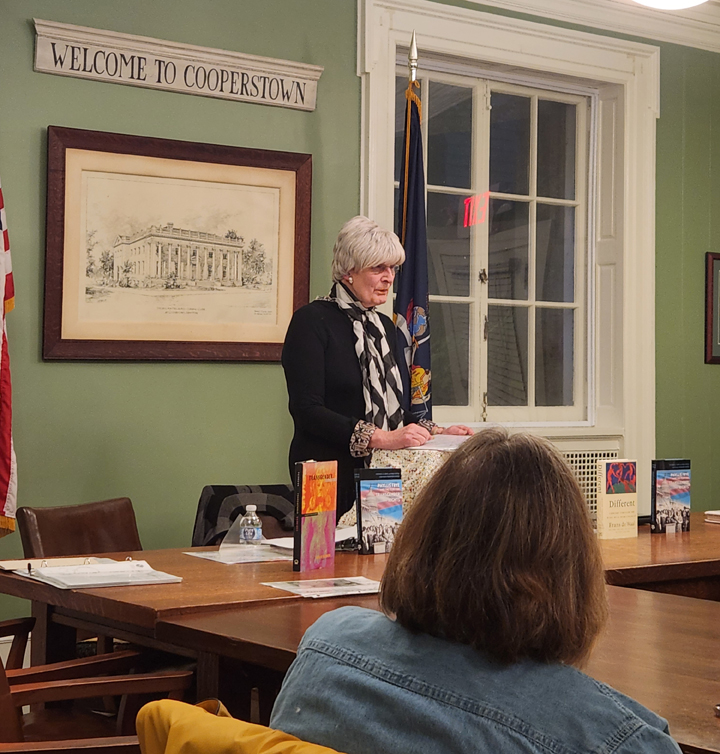
Historian Sharon Stuart reads selections from her collected works on the history of the transgender liberation movement. (Photo by Wriley Nelson)
Stuart Presents Readings, Lecture on History of Trans Liberation Movement
By WRILEY NELSON
COOPERSTOWN
Otsego Town Historian and Iron String Press contributing writer Sharon Stuart gave a lecture on the history of the transgender liberation movement at the Cooperstown Village Hall on Friday, June 16. The talk revolved around Stuart’s research for and contributions to an upcoming book by Carolyn and Christopher Wolf-Gould, Oneonta-based physicians who have become nationally-respected leaders in gender-affirming care. Stuart read several excerpts from her essays on the history of the movement, including reflections on her own experiences as an activist.
Stuart traced the modern American transgender liberation movement to the Second World War, linking it to other civil rights with their roots in the great political, economic and cultural shake-up of full mobilization.
“World War Two was what got American women in pants,” Stuart said. “Until those factory jobs came along, women could be arrested in most places in the U.S. for wearing pants. It helped raise new questions about gender expression and identity.”
Throughout the lecture, she emphasized common stages in the history of many civil rights movements. Her theory of social change posits that a minority group, oppressed by the wider society for one reason or another, gradually raises its profile and forms alliances with legal, scientific, political, and civil-society groups to mobilize its own members and sympathetic members of the broader population.
The first and longest selection recalled Stuart’s encounter with legendary transgender activist Virginia Prince and famous physician Dr. Harry Benjamin at Prince’s Beverly Hills home in 1968. Prince was the founder and publisher of “Transvestia,” an underground magazine that played a critical role in knitting together a nationwide trans community. She also founded the Society for the Second Self, or “Tri-Ess,” an international educational, social, and support group for heterosexual cross-dressers and their families.
Dr. Benjamin was a German-American endocrinologist and sexologist whose decades of work largely created modern gender-affirming health care. His patient, Christine Jorgensen, a WWII veteran who made front-page international news after transitioning in the early 1950s, became the first famous transgender activist in the U.S.
After reflecting on her conversation with Benjamin, which covered everything from the Vietnam War to Stuart’s own childhood, Stuart read her history of a “boot camp for new women” held on the Pacific coast of Oregon in the 1970s and 80s. The camp, hosted and staffed by a Seattle-area modeling agency, was “almost like a finishing school,” Stuart recalled. The young cisgender women who served as instructors provided a crash course in speech, movement, etiquette and bearing for people “whose mothers had not taught them how to be women.”
Stuart played a critical role in integrating PFLAG—the country’s oldest and largest organization that unites parents, families and allies of LGBTQ people—founded in 1973. PFLAG did not advocate for trans issues or allow trans members for its first two decades. This changed in 1998, in part thanks to Stuart’s tireless lobbying of voting members. She recalled following a board member to a Nordstrom and discussing trans inclusion as they browsed in the dress department. PFLAG became the first nationwide LGBTQ organization to officially adopt a trans-inclusive policy; Stuart helped write the organization’s information booklet for parents of transgender people. She has also assisted numerous legal and political campaigns for gay and transgender rights.

